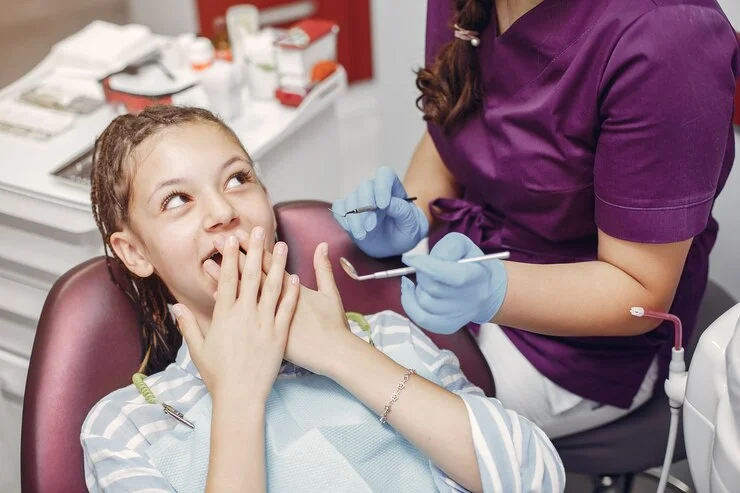Dental phobia affects millions, causing anxiety that may prevent necessary treatment and lead to worse oral health. This guide explores the causes of dental fear and offers practical tips and coping strategies to help you overcome anxiety related to needles, pain, or general fear, empowering you to take control of your dental care and maintain optimal oral health.
Understanding the Fear of Dental Treatment
The fear of dental treatment can manifest in different ways, and recognizing the symptoms is crucial to addressing it effectively. While it’s normal to feel some anxiety before a dental visit, dental phobia occurs when these feelings become overwhelming and prevent you from seeking care. Common symptoms of dental phobia include physical reactions such as fainting, sweating, nausea, and dizziness when faced with dental treatment.
Other symptoms include an increased heart rate and changes in blood pressure, either spiking or dropping, which can worsen feelings of anxiety. Many people with dental phobia also struggle with sleep difficulties before appointments, as the anticipation causes heightened fear. In severe cases, extreme anxiety or panic can make it nearly impossible to undergo necessary dental procedures, further compounding the problem.
The Causes of Fear of Dental Treatment
Understanding the root causes of dental fear is an important step in overcoming it. Several factors can contribute to this anxiety, and identifying them can help address the issue more effectively. One major cause is previous traumatic dental experiences, such as painful procedures or negative interactions with dental staff. These past events can create lasting fear and apprehension toward future treatments.
Another common factor is the fear of pain, particularly for individuals who have experienced discomfort during dental procedures in the past. Fear of needles, or belonephobia, is also prevalent, as many people find dental injections particularly anxiety-inducing. Additionally, a sense of loss of control—being in a vulnerable position during treatment—can heighten feelings of fear and helplessness. Lastly, embarrassment or the fear of being judged due to the condition of one’s teeth can prevent individuals from seeking dental care, contributing to the development of dental phobia. Understanding these triggers can help you take proactive steps to manage your anxiety.
Coping Mechanisms for Overcoming Fear of Dental Treatment
Overcoming a fear of dental treatment takes time, patience, and a willingness to take gradual steps toward your goal. Below are some effective strategies to help you manage and ultimately conquer your dental phobia:
Seek Support from Understanding Dentists
Finding a dentist who specializes in treating anxious patients can greatly improve your experience. Look for one who offers a compassionate, supportive environment to ease your fears. Ask for recommendations from friends, family, or your healthcare provider for dentists experienced in handling dental phobia.
Explore Sedation Dentistry
Sedation dentistry is a great option for those with severe dental phobia. Sedatives can help you relax and feel more at ease during procedures. There are various sedation levels, from mild to deep sedation or general anesthesia. Talk to your dentist about the best choice based on your anxiety and treatment needs.
Practice Relaxation Techniques
Practicing relaxation techniques can be very effective in managing dental phobia. Deep breathing, meditation, and visualization can help calm your mind and body before and during appointments. Incorporating these techniques into your daily routine can gradually reduce anxiety and build resilience over time.
Communicate with Your Dentist
Open communication with your dentist is key to overcoming dental fear. Share your concerns so they can adjust their approach to ensure your comfort. Building a trusting relationship with your dentist can help reduce anxiety and boost your confidence in receiving care.
Gradual Exposure and Desensitisation
Gradual exposure and desensitization involve slowly increasing your exposure to dental procedures. Begin with simple, non-invasive treatments and work up to more complex ones as you gain comfort. This step-by-step approach helps build trust and confidence, reducing fear and anxiety over time.
Cognitive-Behavioral Therapy (CBT)
Cognitive Behavioral Therapy (CBT) is a well-known approach for treating dental phobia. It helps identify and challenge negative thoughts about dental treatments, replacing them with more positive, realistic ones. This shift in thinking can reframe your perception of dental procedures, reducing fear and anxiety.
Conclusion
Overcoming your fear of dental treatment is entirely possible with the right strategies and support. By understanding the root of your anxiety and using effective coping techniques, you can take control of your dental health and receive the care you need without the stress. Remember, every small step you take is an important accomplishment. With time, patience, and support (and perhaps sedation dentistry), you can conquer your dental phobia and achieve optimal oral health. Don’t let fear stand in your way—take the first step toward a healthier, more confident smile today!







